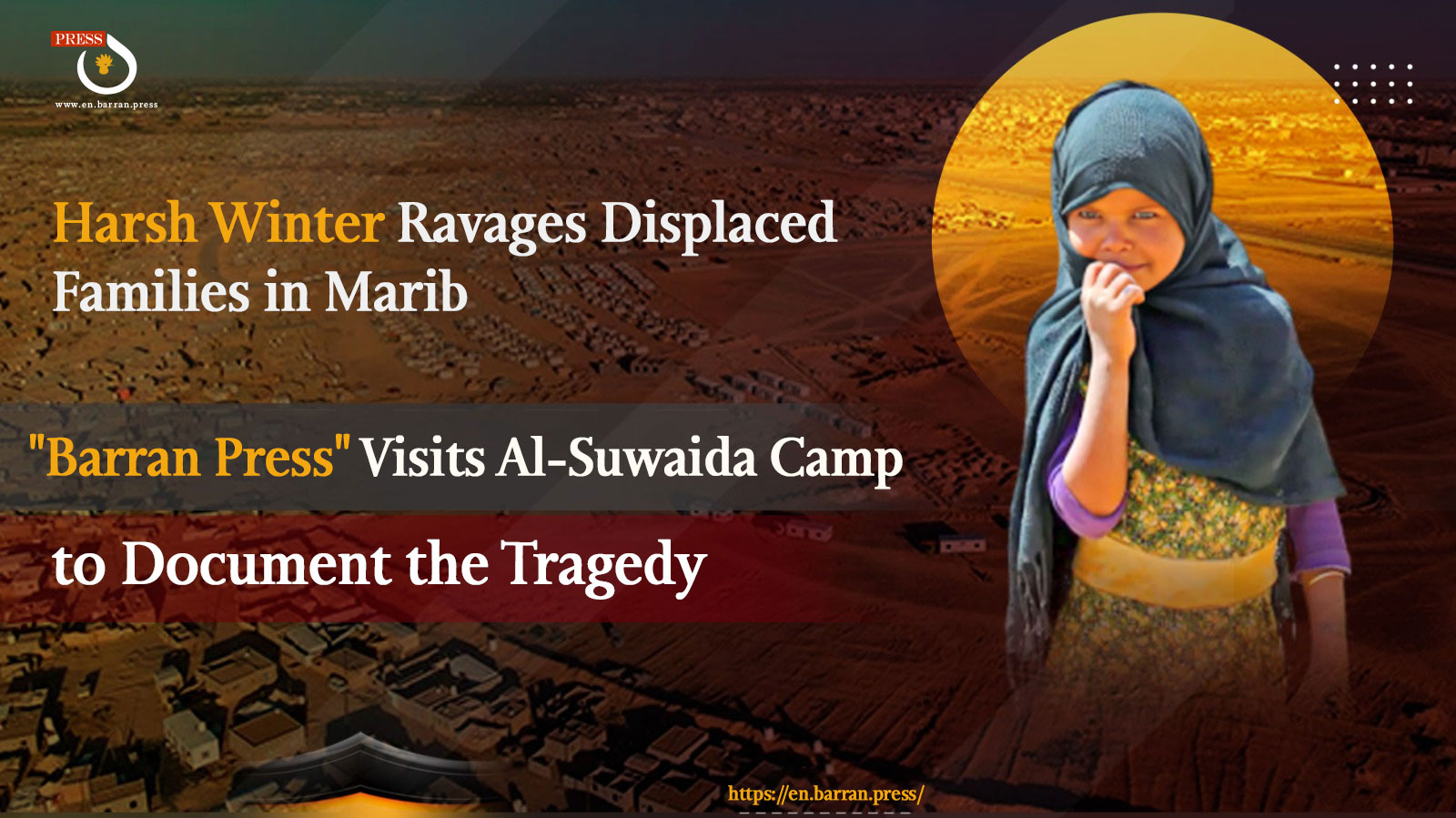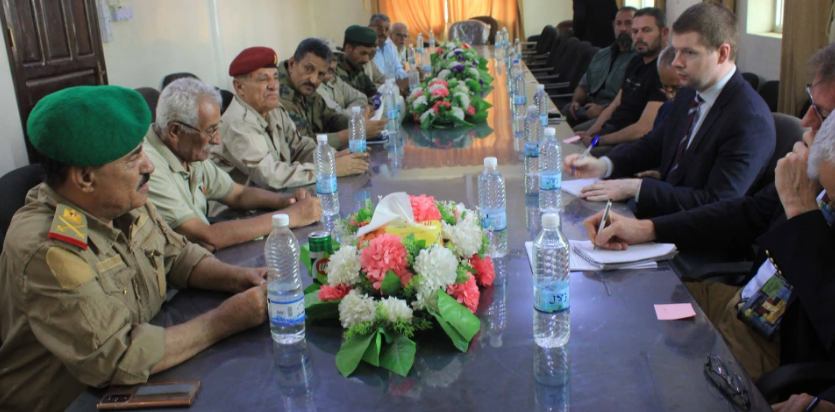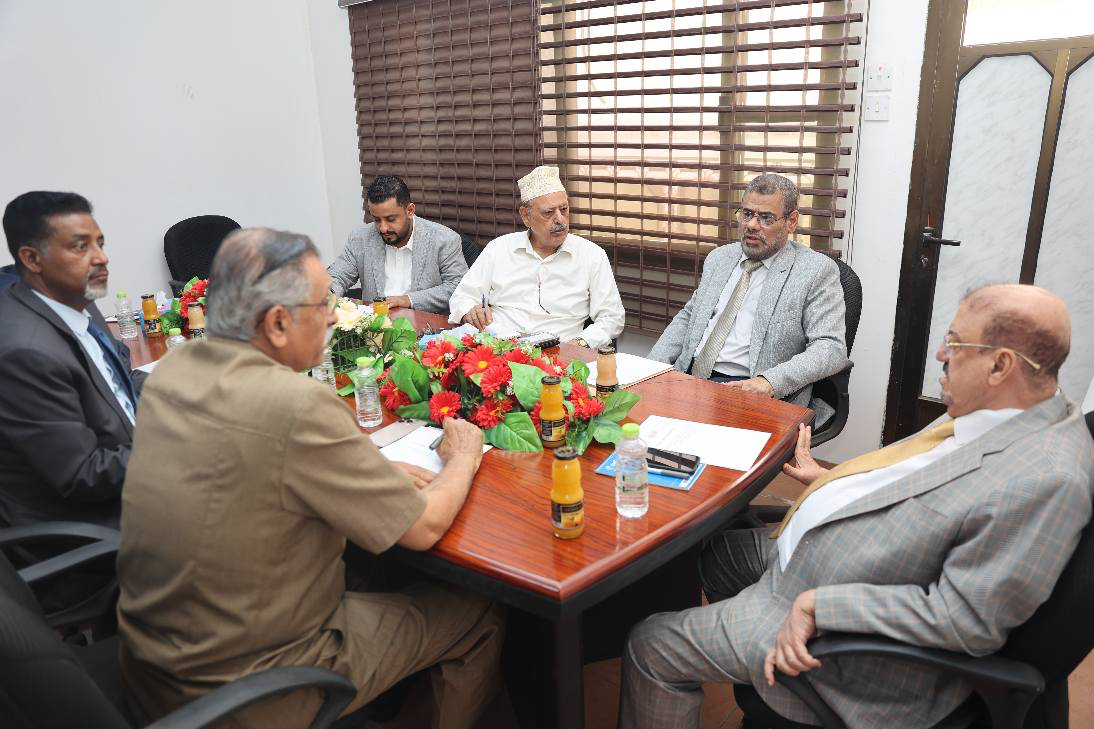
Barran Press - Fares Al-Suraihi
Under tattered tents, nearly 300,000 Yemeni families endure the harsh winter in displacement camps across Marib (northeast Yemen). Each family faces the biting cold with minimal protection, relying only on worn-out tents or tattered clothing.
More than 200 official displacement camps in Marib have been simultaneously hit by the winter, changing their living conditions drastically. The severe cold bites at the faces and chests of children, cracks the hands of fathers and brings tears to mothers' eyes.
In addition to the cold, families struggle with hunger, high prices, lack of work, and the hope of ending the war and returning to their homes.
Al-Suwaida: Rugged Terrain and Prolonged Suffering
"Barran Press" visited Al-Suwaida Camp, located east of Sirwah District, about 8 km west of Marib city. The camp stretches north along the Marib-Sanaa highway for about 1 km² and is surrounded by volcanic mountains reaching heights of over 500 meters to the west.
Al-Suwaida is the second-largest displacement camp in Marib after Al-Jafina, hosting between 2,000 to 2,500 displaced families. According to a survey conducted by the Camp Management and Coordination Group in November 2022, the camp housed 1,645 families comprising 8,772 individuals.
Most of these families come from Nahm District (east of Sanaa), as well as Madghal and Al-Jadaan areas in northwestern Marib, with others from Al-Jawf and Amran governorates. The camp includes child-headed families, people with disabilities, the elderly, and numerous pregnant and breastfeeding women. According to the survey, food, water, and cash assistance are priority needs for the displaced.
Unlike other desert-like camps in Marib, Al-Suwaida sits on harsh volcanic terrain, making the cold even more severe for the displaced residents.
Severe Hardships
In the northwest of the camp, "Barran Press" met displaced resident Saleh Al-Jahmi (48), originally from the Jahm tribe in western Marib. He and his family were displaced in 2015 following an attack by the Houthis.
Al-Jahmi described the "severe suffering" faced by the displaced with the arrival of winter, especially for children and the elderly. In a video interview, he said, "The displaced have nothing to protect them from the severe cold these days... no mattresses, no blankets, no jackets."
Regarding basic food supplies, he added, "There is nothing except what they buy from the market, and prices are high. To cope with the cold, we need blankets, mattresses, tents, tarps, coats, and pajamas, especially for the elderly and children."
He noted that the shelters in the camp are merely "makeshift tents and meshes that do not protect the displaced from the intense cold." He also mentioned that containers are not allowed, and displaced families cannot build block shelters to protect their children.
Many children found in the camp did not wear heavy winter clothing. Rarely did we find a child with gloves or hats, and the same applied to men and the elderly. Many said they did not own heavy clothing.
Health Risks
Displaced resident Abdulrahman Al-Qader told "Barran Press" that around 2,500 families in Al-Suwaida are enduring severe hardship this season due to the extreme cold. He added that fevers, colds, and inflammations have spread significantly, overwhelming the field hospital with cases.
He explained that "the displaced live in tents without adequate shelter from the cold, and there is a lack of essential items like bedding, blankets, warm clothing, and medicines. As the cold increases, so do cases of winter illnesses."
Dr. Manea Al-Jabri, head of epidemiological surveillance at the Al-Suwaida field hospital, said the hospital receives about 200-220 cases daily.
He added that the hospital provides services to the displaced free of charge but lacks support to cover the needs, especially medicines and lab solutions.
Bajash: Disability, Displacement, and Suffering
Displaced resident Ahmed Hamoud Maqbil Bajash (85) from Amran province shared his suffering without support from the recognized Yemeni government or international organizations.
Al-Suwaida is the third displacement site for Bajash, who first fled to Al-Jawf province and then to Al-Rawda area in western Marib before leaving due to a large-scale Houthi attack.
Bajash suffers from partial disability in his leg and left eye due to a road accident in 2013, which prevented him from obtaining a government job to support his family of eight.
He told "Barran Press" about the difficulty of his situation as an unemployed person without a monthly pension. He added that he had received no assistance since his displacement to Marib six and a half years ago.
"When I first fled, they gave me a mattress five years ago, and now it's torn. I have a shack (tent), and we are eight people inside, severely suffering from the cold. No mattress, no shelter," he said.
Tents: A Forced Choice
Most displacement camps in Marib, including Al-Suwaida, are located on land owned by local tribes, who do not allow permanent construction for fear of losing ownership.
While touring Al-Suwaida, "Barran Press" found displaced resident Abdulrahman Al-Najjar digging through volcanic rocks with his young children to build a room to protect themselves from the cold.
Abdulrahman, who has four children and recently had a newborn, said, "We live in a mesh shelter and try to build a mud room to cope with the cold." He had previously rented an apartment in the Al-Khair Complex in Marib City for six years but was forced to move to the camp due to rising rent costs.
Saeef Mathna, Director of the Executive Unit in Marib, mentioned in a previous interview with "Barran Press" that many displaced families who had lived in cities and rural areas have moved to camps.
He said the camp has become the "last refuge" for those who spent all their money and assets and could no longer afford housing costs.
Multiple Hardships
Teacher Ghaleb Ayyash said the reasons for people's displacement are known, but the lack of intervention by relevant organizations to meet the needs of the displaced in this camp, especially winter needs, is not.
He told "Barran Press" that the camp suffers in all aspects. "We visited families who could not sleep due to the severe cold," he said.
He confirmed what Abdulrahman Al-Qader mentioned about the overcrowded hospital, adding, "The hospital and doctors are present, but the treatment is not."
He called for urgent intervention in shelter and health and all aspects, asking, "If they don't intervene now, when will they?"
No Interventions
According to Saeef Mathna, Marib hosts 2.2 million displaced people from 14 Yemeni provinces, with over 292,000 families living in 208 official displacement camps, while 86% live in residential communities in cities and villages.
He added that organization interventions in Marib are very low, especially in shelter, heating supplies, and food, despite 62% of Yemen's displaced population being in Marib and 76% of those in government-controlled areas.
He confirmed that "many families still live in shelters that do not protect them from the cold." He said, "We still have over 80,000 displaced families without any food security interventions."





